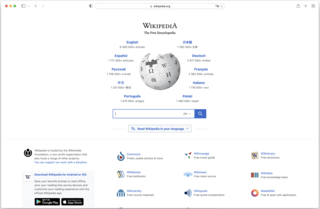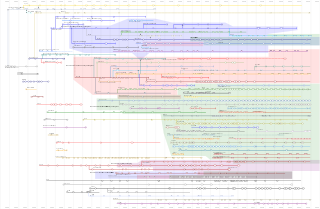
A web browser is an application for accessing websites. When a user requests a web page from a particular website, the browser retrieves its files from a web server and then displays the page on the user's screen. Browsers are used on a range of devices, including desktops, laptops, tablets, and smartphones. In 2020, an estimated 4.9 billion people have used a browser. The most used browser is Google Chrome, with a 65% global market share on all devices, followed by Safari with 18%.
Gecko is a browser engine developed by Mozilla. It is used in the Firefox browser, the Thunderbird email client, and many other projects.

Mozilla Firefox, or simply Firefox, is a free and open-source web browser developed by the Mozilla Foundation and its subsidiary, the Mozilla Corporation. It uses the Gecko rendering engine to display web pages, which implements current and anticipated web standards. In November 2017, Firefox began incorporating new technology under the code name "Quantum" to promote parallelism and a more intuitive user interface. Firefox is available for Windows 10 or later versions, macOS, and Linux. Its unofficial ports are available for various Unix and Unix-like operating systems, including FreeBSD, OpenBSD, NetBSD, illumos, and Solaris Unix. It is also available for Android and iOS. However, as with all other iOS web browsers, the iOS version uses the WebKit layout engine instead of Gecko due to platform requirements. An optimized version is also available on the Amazon Fire TV as one of the two main browsers available with Amazon's Silk Browser.

A browser war is a competition for dominance in the usage share of web browsers. The "first browser war," (1995–2001) pitted Microsoft's Internet Explorer against Netscape's Navigator. Browser wars continued with the decline of Internet Explorer's market share and the popularity of other browsers including Firefox, Google Chrome, Safari, Microsoft Edge and Opera.
In computing, the User-Agent header is an HTTP header intended to identify the user agent responsible for making a given HTTP request. Whereas the character sequence User-Agent comprises the name of the header itself, the header value that a given user agent uses to identify itself is colloquially known as its user agent string. The user agent for the operator of a computer used to access the Web has encoded within the rules that govern its behavior the knowledge of how to negotiate its half of a request-response transaction; the user agent thus plays the role of the client in a client–server system. Often considered useful in networks is the ability to identify and distinguish the software facilitating a network session. For this reason, the User-Agent HTTP header exists to identify the client software to the responding server.
Mozilla Firefox has features that allow it to be distinguished from other web browsers, such as Chrome and Internet Explorer.

TiddlyWiki is a personal wiki and a non-linear notebook for organising and sharing complex information. It is an open-source single page application wiki in the form of a single HTML file that includes CSS, JavaScript, embedded files such as images, and the text content. It is designed to be easy to customize and re-shape depending on application. It facilitates re-use of content by dividing it into small pieces called Tiddlers.

Mozilla Firefox 3.0 is a version of the Firefox web browser released on June 17, 2008, by the Mozilla Corporation.

Zotero is a free and open-source reference management software to manage bibliographic data and related research materials, such as PDF files. Features include web browser integration, online syncing, generation of in-text citations, footnotes, and bibliographies, an integrated PDF reader and note editor, as well as integration with the word processors Microsoft Word, LibreOffice Writer, and Google Docs. It was originally created at the Center for History and New Media at George Mason University and, as of 2021, is developed by the non-profit Corporation for Digital Scholarship.

Mozilla Firefox 4 is a version of the Firefox web browser, released on March 22, 2011. The first beta was made available on July 6, 2010; Release Candidate 2 was released on March 18, 2011. It was codenamed Tumucumaque, and was Firefox's last large release cycle. The Mozilla team planned smaller and quicker releases following other browser vendors. The primary goals for this version included improvements in performance, standards support, and user interface.

Mozilla Firefox 2 is a version of Firefox, a web browser released on October 24, 2006 by the Mozilla Corporation.

Firefox for Android is a web browser developed by Mozilla for Android smartphones and tablet computers. As with its desktop version, it uses the Gecko layout engine, and supports features such as synchronization with Firefox Sync, and add-ons.

Opera is a multi-platform web browser developed by its namesake company Opera. The browser is based on Chromium. Opera is available on Windows, macOS, Linux, Android, and iOS. There are also mobile versions called Opera Mobile and Opera Mini. Opera users also have access to Opera News, a news app based on an AI platform.
Firefox Sync, originally branded Mozilla Weave, is a browser synchronization feature for Firefox web browsers. It allows users to partially synchronize bookmarks, browsing history, preferences, passwords, filled forms, add-ons, and the last 25 opened tabs across multiple computers. The feature is now included in Firefox and is being implemented in Thunderbird.
HTML5 Audio is a subject of the HTML5 specification, incorporating audio input, playback, and synthesis, as well as, in the browser. iOS
Firefox was created by Dave Hyatt and Blake Ross as an experimental branch of the Mozilla browser, first released as Firefox 1.0 on November 9, 2004. Starting with version 5.0, a rapid release cycle was put into effect, resulting in a new major version release every six weeks. This was gradually accelerated further in late 2019, so that new major releases occur on four-week cycles starting in 2020.

Cliqz was a privacy-oriented web browser and search engine developed by Cliqz GmbH and majority-owned by Hubert Burda Media. It was available as a desktop and mobile web browser as well as an extension for Firefox itself.
Firefox Lockwise is a deprecated password manager for the Firefox web browser, as well as the mobile operating systems iOS and Android. On desktop, Lockwise was simply part of Firefox, whereas on iOS and Android it was available as a standalone app.
The project that became Firefox today began as an experimental branch of the Mozilla Suite called m/b. Firefox retains the cross-platform nature of the original Mozilla browser, using the XUL user interface markup language. The use of XUL makes it possible to extend the browser's capabilities through the use of extensions and themes. The development and installation processes of these add-ons raised security concerns, and with the release of Firefox 0.9, the Mozilla Foundation opened a Mozilla Update website containing "approved" themes and extensions. The use of XUL sets Firefox apart from other browsers, including other projects based on Mozilla's Gecko layout engine and most other browsers, which use interfaces native to their respective platforms. Many of these projects started before Firefox, and probably served as inspiration.







